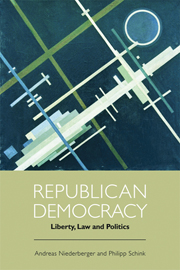Book contents
- Frontmatter
- Contents
- List of contributors
- Introduction
- 1 The Tension between Law and Politics in the Modern Republican Tradition
- 2 Impotence, Perspicuity and the Rule of Law: James Madison's Critique of Republican Legislation
- 3 Kant, Madison and the Problem of Transnational Order: Popular Sovereignty in Multilevel Systems
- 4 Republicanism and Democracy
- 5 Two Views of the City: Republicanism and Law
- 6 A Kantian Republican Conception of Justice as Nondomination
- 7 Two Republican Traditions
- 8 Freedom, Control and the State
- 9 Legal Modes and Democratic Citizens in Republican Theory
- 10 Rights, Republicanism and Democracy
- 11 Republicanism and Global Justice: A Sketch
- 12 Republicanism and Transnational Democracy
- Index
8 - Freedom, Control and the State
Published online by Cambridge University Press: 05 October 2013
- Frontmatter
- Contents
- List of contributors
- Introduction
- 1 The Tension between Law and Politics in the Modern Republican Tradition
- 2 Impotence, Perspicuity and the Rule of Law: James Madison's Critique of Republican Legislation
- 3 Kant, Madison and the Problem of Transnational Order: Popular Sovereignty in Multilevel Systems
- 4 Republicanism and Democracy
- 5 Two Views of the City: Republicanism and Law
- 6 A Kantian Republican Conception of Justice as Nondomination
- 7 Two Republican Traditions
- 8 Freedom, Control and the State
- 9 Legal Modes and Democratic Citizens in Republican Theory
- 10 Rights, Republicanism and Democracy
- 11 Republicanism and Global Justice: A Sketch
- 12 Republicanism and Transnational Democracy
- Index
Summary
The reasons for what is nowadays labeled the republican revival are certainly manifold. From reasons that lie in the dynamics of academic discourse up to reasons that are rooted in political controversies1 the lasting interest (and correspondingly the expectation about the benefits of the republican political theory) in republicanism has various reasons. In what follows I will try to concentrate on one distinctive feature – or thesis – of republicanism that is more or less a unifying theme in the various strands of republican political theory. This “republican thesis” consists in the belief that freedom and a republican state are at least compatible or that freedom is even constituted by the republic.
The belief in the possibility of conceptualizing (and under certain circumstances even realizing) a form of an effective political order that is not per se based on a restriction of freedom becomes particularly attractive against the background of the experiences of the twentieth century. Up to the late 1970s political hope for a free society was closely connected with the state: While the national liberation movements of developing countries and colonies viewed the building of a national state as the way to end foreign domination, most progressive, social-democratic or socialist movements identified the state as the way for liberation from internal domination (mostly seen as being caused by an unequal control of the means of production). The reality of the post-colonial and socialist states led to a deep-going disillusionment, which nowadays has turned into fundamental skepticism about the relation between freedom and the state. This skepticism again fuelled a renewal of classic liberal political thought that culminated in the political movement of neo-liberalism?
- Type
- Chapter
- Information
- Republican DemocracyLiberty, Law and Politics, pp. 205 - 232Publisher: Edinburgh University PressPrint publication year: 2013

